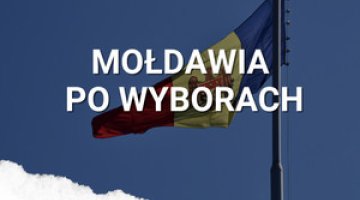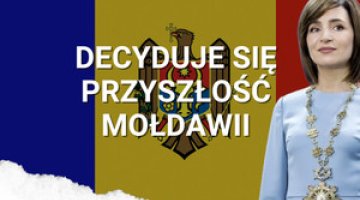A risky attempt to break the political deadlock in Moldova
On 15 January, the leaders of the three parties in Moldova’s ruling coalition, the Alliance for European Integration, announced that a referendum would be held in April to modify the procedures for presidential elections. This change will involve reducing the number of votes needed in parliament to elect a president from 61 (a three-fifths majority) to 51 (50% +1). The Alliance hopes in this way to avoid another, third in a row, early parliamentary elections, fearing that the opposition Communist Party could win them. However, the Alliance’s initiative is risky, and could have counter-productive effects.
A stable political crisis
For nearly three years, Moldovan parliaments have failed to elect a president. There are three reasons for this. Firstly, a candidate must win the support of up to three-fifths of the deputies. Secondly, the political scene is polarised between the Communist camp (who are pro-Russian) and the anti-Communist camp (who are European-oriented), and there is deep distrust between the leaders of both camps. Thirdly, there is a stable distribution of electoral sympathies, which has not allowed either of the camps to win three-fifths of the seats in three consecutive elections. This inability to choose a president, in turn, destabilises the political situation in the country, because under the constitution a parliament which cannot choose a president must be dissolved. Together with the provision that early elections cannot be held within a year of the previous elections, this means that even a stable parliamentary majority cannot hope to remain in power longer than a year to year and a half. In this situation, it is not possible to govern the country efficiently, much less carry out the long-term reforms which Moldova urgently needs.
Furthermore, the decision of the Constitutional Court on 12 January made choosing a president effectively impossible under the current rules. The court annulled the attempt made last 16 November to elect the president in parliament, by invoking a constitutional violation of the requirement to hold the ballot in secret (some of the deputies showed their completed ballots before putting them into the ballot box). This decision by the court opened up the possibility that in the future any group of deputies could sabotage the process of electing the president.
The coalition’s tactics
For the second time, the ruling Alliance has found itself in a situation where, because it does not have a three-fifths majority in parliament, and is unable to find a common candidate with the opposition, it is obliged after a year of government to call early elections once again. As a result, the coalition is once again trying to avoid early elections by proposing to hold a referendum to change the procedure for electing a president. The Alliance already made such an attempt in September 2010, when it proposed the introduction of universal direct presidential elections, an idea which enjoys wide public support. The majority of voters supported the project, but due to the low turnout (29% instead of the required 33%) the results of the referendum were not binding.
There is a serious risk that resorting once again to a referendum will end in failure, even if the coalition abolishes the minimum turnout threshold. The Communists will seek to transform the referendum into a plebiscite on public trust in the government and a vote against the Alliance’s proposals. Recent opinion polls show an increase in the Communists’ popularity, and very low ratings for the Alliance government. Moreover, due to a constitutional ban on putting the same proposal to a referendum within two years, the Alliance cannot offer the direct elections which are popular among the public, but only a reduction of the required majority when electing the president in parliament, from three-fifths of the deputies to 50%+1. A recent public opinion poll suggests that the plurality of voters is against the election formula proposed by the ruling coalition (with only 30% supporting, 40% against and 30% undecided).
Prospects for further development of the situation
Paradoxically, even if the alliance wins the referendum on the matter, the Communists may benefit most. Some experts argue that for legal-constitutional reasons the modified procedure could not be used in the current parliament, and therefore it will have to be dissolved. If the Constitutional Court favours this view (and the Communists would certainly solicit its opinion), the Alliance would not avoid early elections, and the Communists would most likely win. Then, the amendment adopted in the referendum would allow them to choose a president without having to negotiate a compromise with the Alliance’s parties.
The Alliance has adopted such a risky strategy, because the alternative – voting for Leonid Talmaci, a former head of the Central Bank who is formally unaffiliated with any political party and whom the Communists recently put forward for the post – seems even more dangerous. Prime Minister Filat might have feared that a new president who owed his position to the Communists would dismiss the government, and try to form a pro-Russian coalition with the Communists, Socialists and some members of the Democratic Party.
The Alliance’s decision to hold a referendum will escalate the political conflict in Moldova. Due to the expected opposition from the Communists, and the disappointment of Alliance supporters with the performance of the current government, its chances of winning the referendum seem rather low – the more so as the parties forming the Alliance are unlikely to present a unified position during the pre-referendum campaign.
The concentration of the ruling camp on the referendum campaign during the coming months will cause further delay in carrying out necessary reforms (announced in late 2011) to the judiciary, local government, and the Ministry of Internal Affairs. However, even if the current government wins the referendum, it is possible that the Constitutional Court will deem that the new procedure for electing a president cannot be used by the current parliament, thus forcing its dissolution and – once again – early elections.





